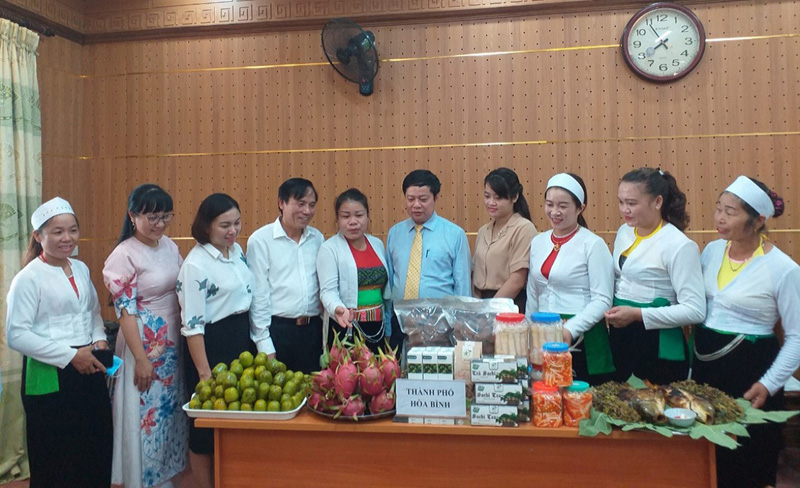
(HBO) - That is the topic of a training conference, organized by Vietnam Fatherland Front, the Provincial Fatherland Front and Clean Agriculture joint Stock Company (Hanoi) in the morning of 9 September.

The delegates visited the booth of
Hoa Binh local agricultural production and trading cooperatives.
The representatives of Vietnam
Fatherland Front, the Standing Committees of Fatherland Front of the province
and 4 districts and the city, the Provincial Women's Union, the Department of
Agricultural and Rural Development, the Ethnic Affairs, the Provincial Steering
Committee Office of new rural areas, some local agricultural production and
trading cooperatives and 80 woman members who need clean agricultural
production.
The delegates watched a clip about
the clean agricultural ecosystems, being trained on the self-production methods
of fertilizers, non-chemical pesticides to protect the environment and ensure
food safety. At the same time, the Clean Agriculture joint Stock Company
disseminated the cultivation solutions without using synthetic chemicals, the
natural farming methods, the ecosystem of probiotics used in agriculture, the
methods to creat nutrients for plants, the methods to protect plants, the water
and soil treatment in agriculture.
Each delegate was given leaflets on
food safety and sanctioned regulations in this field according to the
Government's Decree No. 115/2018 / ND-CP.
In the framework of the training
session, the delegates visited, learned and exchanged experiences and methods
of producing and trading the local agricultural products in Hoa Binh province.
The provincial Fatherland Front has
also launched a movement to consume clean agriculture to protect the
environment and ensure food safety at the training session.
Hoa Binh province is undergoing a dynamic transformation amid Vietnam’s national digital transition. Building on Poliburo’s Resolution No. 57-NQ/TW on breakthroughs in science, technology, innovation, and national digital transformation, the province has rolled out a wide range of practical action plans. A standout initiative is the "Digital Literacy for All” movement, an effort to ensure that no one is left behind in the digital era.
Hoa Binh province is undergoing a dynamic transformation in the wake of the national digital transformation movement. Building on Resolution No. 57-NQ/TW of the Politburo on breakthroughs in science, technology, innovation, and national digital transformation, the province has implemented a wide range of practical action plans. A standout initiative is the "Digital Literacy for All” movement ambitious effort to ensure that no one is left behind in the digital age.
With a spirit of unity and proactive problem-solving, the Party Committee, the government and the people of Dong Lai Commune (Tan Lac District) have made great strides in implementing the resolutions of the 24th Party Congress of the commune for the 2020 - 2025 term. Focusing on leadership and practical actions, the commune has brought the Party’s resolutions into daily life, creating strong impacts and pushing the local development forward.
Amid the nationwide push for digital transformation, young people in Hoa Binh Province are stepping up as dynamic pioneers, applying technology to enhance Youth Union operations and expand the reach of youth-led initiatives. Through creativity and adaptability, Youth Union organizations at all levels have introduced a series of practical solutions, contributing to modern governance and community development.
In recent years, An Nghia commune, located in Lac Son district, has stepped up administrative reform, focusing on improving the quality and efficiency of its single-window service unit for receiving and processing administrative procedures. These improvements have helped create favourable conditions for local residents and organisations to handle administrative procedures, contributing to the commune’s broader socio-economic development.
The Prime Minister-approved master plan to develop the multi-use value of forests ecosystems through 2030, with a vision to 2050, aims to improve the management and sustainable use of forest resources, create jobs, increase incomes, and improve the living standards of ethnic minorities, people in mountainous and remote areas, forest workers and those living near forests.



